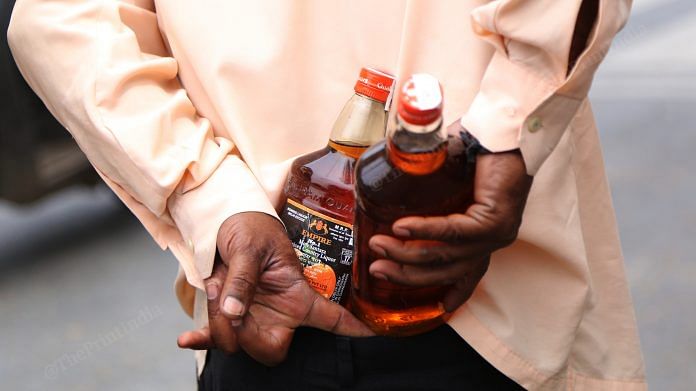New Delhi: Bihar may have relaxed its liquor law to allow ‘first-time’ offenders to get off with a fine instead of time behind bars, but the reality has been sobering for many of the accused.
Over 1.5 lakh cases registered against first-time offenders are still stuck in various trial courts in the dry state. The reason — the state government and Patna High Court have not been able to agree on who is the appropriate authority to hear these matters.
Ironically, the amendment to the law came about last year after the Supreme Court reprimanded the Bihar government in 2021 over state courts being clogged with liquor prohibition cases, particularly those against first-time offenders.
To address this issue, the state government last March relaxed section 37 of the Bihar Prohibition and Excise Act 2016. This section punishes ‘non-habitual’ liquor drinkers — essentially, those who haven’t been accused before.
The original law mandated three months behind bars or a Rs 50,000 fine for first-timers, but the amendment stipulated that such offenders could now just pay a fine (the amount was not specified) before an executive magistrate and not face any jail time. Those unable to pay faced a month of simple imprisonment. The accused could also challenge the charges.
Despite the amendment, the cases continue to languish, possibly due to a legislative oversight.
This was revealed in documents that the Bihar government filed last week in Supreme Court, which, faced with a flood of bail applications arising out of the liquor prohibition law, is taking stock of the state’s judicial infrastructure to deal with such cases.
These documents, accessed by ThePrint, show that behind the pendency of liquor consumption cases is a disagreement between the state government and Patna High Court.
While the state administration wants executive magistrates — who are government officers — to hear and dispose of liquor-drinking cases, the high court is of the view that only a judicial magistrate should have the power to hold trials in these matters.
The Patna HC also turned down the state’s attempt at a solution, which was to designate its judicial magistrates to hear these matters. The court’s argument was that the law confers this power only to an executive magistrate, and so it cannot be assigned to a judicial officer.
While the HC has advised the state to make suitable amendments to the Bihar Prohibition and Excise Act to allow a judicial magistrate to hear these cases, the state has declined to do so. Instead, it has asked the HC to reconsider its view and accept the state’s measure to nominate judicial magistrates so that the workload of the judiciary can come down.
This tussle between the state and judiciary, which began soon after the law was amended, became a subject of discussion last week in the Supreme Court. Upon a brief hearing, the SC asked the government to consider amending the law.
Also read: Nitish Kumar is riding a tiger with prohibition in Bihar. Everyone knows it’s failed
‘Ego issue’
An SC bench led by Justice Sanjay Kishan Kaul told the state government counsel, senior advocate Ranjit Kumar, that prima facie it agreed with the Patna HC’s view that executive magistrates cannot be authorised with a judicial magistrate’s power to send an accused to jail.
Expressing its reservation on the issue, the court said that the government should not make it an ego issue and resolve the anomaly in the law.
Speaking to ThePrint, advocate Gaurav Aggarwal, who is assisting the SC bench in the matter, agreed with the HC’s opinion. He said the impugned provision imparted judicial powers to an executive magistrate, which could not have been done.
However, the Bihar government in its affidavit has insisted that an executive magistrate cannot be precluded from holding trials under section 37 of the Bihar Prohibition and Excise Act.
The state submitted that power for summary trial has been conferred upon executive magistrates under a local statute called Bihar Conduct of Examination Act, 1981. Under this law, duly authorised executive magistrates can dispose of cases through summary trials where the offences are cognizable and non-bailable, and punishable with a sentence of up to six months or a fine of up to Rs 2,000.
Bihar also cited examples of other state statutes where executive magistrates have been empowered to send lawbreakers to jail — the Orissa Scheduled Areas Transfer of Immovable Property Regulation, 1956, where an offence is punishable with a sentence of up to two years and/or a fine of up to Rs 5,000, and the Orissa Debt Relief Act 1980 that prescribes two years jail and/or a fine up to Rs 5,000 for those found guilty.
In response to the HC’s suggestion to make suitable amendments to the law so that judicial magistrates can take up cases of first-time offenders arrested for consuming liquor, the state said it is not necessary.
The reply, which is part of the Bihar government’s affidavit in the SC, argues that special courts headed by additional sessions judges (who are senior to judicial magistrates) are currently hearing cases lodged under section 37. Further, this is being done despite the amended law not conferring powers to these ADJ courts.
“If at present, section 37 cases can be looked after by ADJ level Special Courts (even though, section 37 talks about Executive Magistrates), then Judicial Magistrates can also look after these cases,” the reply said.
(Edited by Asavari Singh)
Also read: Bihar continuing with liquor ban is an exercise in madness with no method



